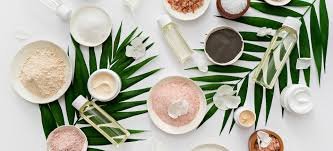Sustainable and Organic Skincare: A Guide to Natural Beauty

In today’s world, sustainability has become a crucial part of daily life, influencing everything from the clothes we wear to the food we consume. The skincare industry is no exception, with sustainable and organic skincare gaining momentum. Consumers are moving away from conventional products filled with synthetic chemicals and opting for natural, eco-friendly alternatives that benefit both their skin and the environment. In this article, we will explore why sustainable skincare matters, the benefits of organic ingredients, and how to build an eco-conscious skincare routine.
Why Sustainable Skincare?
Sustainable skincare goes beyond just the ingredients in the products. It involves the entire lifecycle of a product, from how it’s sourced, manufactured, packaged, and disposed of. Conventional skincare products often contain chemicals that are harmful to the environment, such as parabens, sulfates, and microplastics. These ingredients contribute to pollution and can disrupt ecosystems when washed down the drain.
Moreover, many traditional beauty brands rely on unsustainable practices like overharvesting natural resources, excessive water usage, and non-recyclable packaging. Sustainable skincare aims to address these issues by focusing on eco-friendly production methods, cruelty-free testing, and using recyclable or biodegradable packaging.

Benefits of Organic Skincare
Organic skincare refers to products made from ingredients that are grown without synthetic pesticides, fertilizers, or genetically modified organisms (GMOs). These natural ingredients are not only better for the environment but are also gentler on your skin, reducing the risk of irritation and allergic reactions. Here are some key benefits of using organic skincare products:
1. No Harmful Chemicals
One of the biggest advantages of organic skincare is the absence of harmful chemicals. Conventional products often contain parabens, phthalates, and synthetic fragrances that can damage the skin and disrupt your body’s hormonal balance. Organic products use natural preservatives like vitamin E and essential oils, which are safer and non-toxic.
2. Nutrient-Rich Ingredients
Organic skincare products are typically packed with vitamins, antioxidants, and essential fatty acids that nourish the skin. Ingredients like aloe vera, shea butter, and rosehip oil are rich in nutrients that hydrate, repair, and protect the skin from environmental stressors.
3. Environmentally Friendly
By choosing organic skincare, you are supporting farming practices that are better for the environment. Organic farming avoids the use of harmful pesticides, which reduces soil degradation and water contamination. Moreover, many organic skincare brands use sustainable packaging and participate in fair trade practices.
4. Cruelty-Free
Most organic skincare brands are committed to cruelty-free practices, meaning they do not test their products on animals. This aligns with the growing consumer demand for ethical products that do not harm animals or exploit workers.
Key Organic Skincare Ingredients
When looking for organic skincare products, it’s important to know which ingredients are the most beneficial for your skin type. Below are some of the most popular organic ingredients and their benefits:
- Aloe Vera: Known for its soothing and hydrating properties, aloe vera is perfect for sensitive or irritated skin. It also helps to reduce inflammation and promote healing.
- Shea Butter: Rich in vitamins A and E, shea butter is a fantastic moisturizer that also helps to heal dry or damaged skin. It’s commonly used in body lotions, lip balms, and creams.
- Coconut Oil: This natural oil is highly effective for moisturizing the skin and has antibacterial properties. It’s especially beneficial for dry skin and can be used as a makeup remover.
- Rosehip Oil: Rosehip oil is packed with antioxidants, essential fatty acids, and vitamin C, which help to brighten the skin and reduce signs of aging. It’s often used in serums and facial oils.
- Green Tea Extract: This powerful antioxidant helps to protect the skin from free radicals, which can cause premature aging. It also has anti-inflammatory properties, making it ideal for acne-prone skin.
How to Build a Sustainable Skincare Routine
Creating a sustainable and organic skincare routine doesn’t have to be overwhelming. Start by evaluating your current products and gradually switching to more eco-friendly alternatives. Here are some tips for building an effective, sustainable skincare routine:
1. Choose Multi-Functional Products
Opt for products that serve multiple purposes to reduce waste. For example, a facial oil that also works as a moisturizer or a cleanser that doubles as a makeup remover. This minimizes the number of products you use, helping to conserve resources.
2. Support Ethical Brands
Research brands that are transparent about their sourcing, manufacturing, and packaging practices. Look for certifications like USDA Organic, Fair Trade, and cruelty-free logos to ensure the brand aligns with your values.
3. Recycle Packaging
Make sure to properly recycle any skincare packaging that can be recycled. Many brands now offer refillable packaging options, reducing plastic waste. You can also upcycle containers for other household uses.
4. Use Water-Efficient Products
Choose products that are formulated with minimal water or water-free altogether, such as solid cleansers or oil-based serums. Waterless beauty products are not only concentrated and effective, but they also help conserve water in production and usage.
5. DIY Skincare
Consider making your own skincare products at home using simple, organic ingredients. DIY recipes for face masks, scrubs, and moisturizers can be just as effective as store-bought products and allow you to control what goes into them.
The Future of Sustainable Skincare
The demand for sustainable and organic skincare is expected to grow as consumers become more eco-conscious and informed about the harmful effects of synthetic chemicals. Brands are likely to continue innovating, offering cleaner products with minimal environmental impact. As sustainability becomes a central value in the beauty industry, we can expect to see more zero-waste packaging, waterless formulations, and sustainable sourcing practices.
Conclusion
Sustainable and organic skincare is more than just a trend; it’s a conscious choice to protect your skin and the environment. By switching to organic products, you’re not only reducing your exposure to harmful chemicals but also supporting ethical and eco-friendly practices. As the beauty industry continues to evolve, embracing sustainability will lead to healthier skin and a healthier planet.




